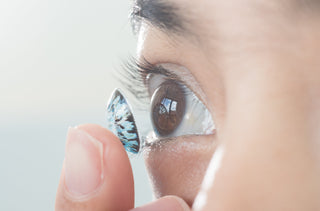Winter has arrived! At this time of year, we can feel the temperature getting colder and colder, and the air becoming drier, both indoors and outdoors. Do you wear contact lenses? You have probably noticed that your eyes can become very sensitive to temperature changes in the winter, which can make wearing contacts uncomfortable during this season.
Can Contacts Freeze in Your Eyes?
Fortunately, it is impossible for contact lenses to freeze in your eyes. The temperature of the cornea and your tears keeps your contacts warm. Even in the most extreme temperatures, you can continue to wear your contact lenses. Rest assured, they will remain intact despite the cold.
Why Do Our Eyes Become Watery During the Winter?
Surprisingly, watery eyes can indicate that they may be dry. Dryness can stimulate the production of tears. During the winter, the cold wind blowing on the cornea and contact lenses can lead to excessive tearing. That is a sure indication that your eyes are trying to rehydrate. Wearing contact lenses can increase eye dryness and make your eyes watery, especially during the winter months.
How to Cope With Dryness in Winter?
Even if you do not necessarily wear contact lenses, your eyes tend to be drier during the winter compared to summer. This is due to the varying temperatures between the outdoors and indoors. Heating dries up the air inside of buildings, houses and cars. Dry eyes can make wearing contact lenses uncomfortable. Optometrists recommend using lubricating drops as needed to moisturize your eyes, especially during the cold weather season. Also, try to avoid standing too close to direct heat sources, such as fireplaces. You can also use a humidifier to keep a certain amount of moisture in your home.
When it's cold, we tend to drink less water than we do during the summer, but staying hydrated is crucial for reducing eye dryness. Also, be sure to change your contacts to the frequency recommended by your Optometrist to make sure your contacts are in good condition and to make wearing them more comfortable. Give your eyes a break by alternating wearing glasses instead of your contacts in the evenings and weekends. This can help reduce dryness. Finally, 1-day lenses are a good option for dry and sensitive eyes.
Wear Sunglasses
In the summer, you probably have the habit of carrying your sunglasses with you, but you should do the same during the winter. Wearing sunglasses during the cold months, is just as important because the sun reflects off of the snow. To reduce the glare caused by reflection on snow and ice, choose polarized glasses. If you want to wear them with your contact lenses, opt for sunglasses without a prescription. Are you a fan of winter sports? Choose curved goggles: they will protect your eyes from the cold winter wind.
If you feel discomfort while wearing your contact lenses this winter, the first thing you need to do is remove them to give your eyes some rest. But what if the discomfort persists? Do not hesitate to consult your Optometrist or Optician at your nearest IRIS store!





















































